Suchergebnisse
# Murau : Real-World Laboratory of energy transition for inner-alpine regions
Inner-alpine regions are rich in the natural resources water, sun, wind and biomass. This study investigated how the Murau region can become a stable and fail-safe, renewable 100% region and how it is possible to supply the energy-hungry conurbations as a needs-based energy export region.
REal - The laboratory for Integrated Regional Renewable Energy Systems
In the REal project, a holistic, scalable and user-friendly concept was created, whereby sector-coupled, municipal energy systems with 100% renewable energy can be implemented, considering all necessary aspects from planning to operation, reducing design costs and accelerating an Austria-wide implementation.
MURREAL: Murtaler Reallabor - On the way to 100% renewable energy by 2040
MURREAL connects the actors of the industrial region Murtal with specialists in the field of high tech and materials with the raw material and energy sector, service providers and research and development. In this exploration for a real laboratory, synergies had been worked out and business models had been built up to consistently take the path towards 100% renewable energy and climate neutrality by 2040.
SmartControl - Standardisierte und smarte Steuerung von kommunalen Energiesystemen
Das Ziel ist die Entwicklung eines standardisierten und einfach implementierbaren Verfahrens für die Kommunikation, Überwachung und Steuerung von dezentralen Technologien innerhalb von kommunalen Energiegemeinschaften. Dazu werden innovative Schnittstellen und selbstlernende Algorithmen entwickelt, welche sicherstellen, dass das Konzept auf Kommunen bzw. Quartiere - ohne großen Daten- und Messaufwand - übertragen werden kann.
Standardisierte und smarte Steuerung von kommunalen Energiesystemen (SmartControl)
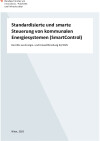
Das Ziel ist die Entwicklung eines standardisierten und einfach implementierbaren Verfahrens für die Kommunikation, Überwachung und Steuerung von dezentralen Technologien innerhalb von kommunalen Energiegemeinschaften. Dazu werden innovative Schnittstellen und selbstlernende Algorithmen entwickelt, welche sicherstellen, dass das Konzept auf Kommunen bzw. Quartiere - ohne großen Daten- und Messaufwand - übertragen werden kann.
Schriftenreihe
82/2025
Stefan Aigenbauer, Pascal Liedtke, Christine Mair, Bernhard Wüster
Herausgeber: BMIMI
Deutsch, 47 Seiten
Downloads zur Publikation
LOW TECH innovation-lab - Reallabor für die Transformation zu klima- und ressourcenschonenden Energieregionen mit innovativen LOW TECH Lösungen
LOW TECH innovation-lab setzt sich den Aufbau eines Innovationslabors zum Ziel, in welchem auf Basis eines optimierten Ansatzes hinsichtlich Technikeinsatz einerseits und Potenzialen der Kreislaufwirtschaft, lokaler Umweltressourcen und sozialer Innovationen andererseits innovative Modellösungen entwickelt, erprobt und in Kooperation mit geeigneten Pilotregionen breit ausgerollt werden.
LOW TECH innovation-lab - real laboratory for the transformation to climate and resource-saving energy regions with innovative LOW TECH solutions
LOW TECH innovation-lab aims to set up an innovation laboratory in which innovative model solutions are developed, tested and widely rolled out in cooperation with suitable pilot regions on the basis of an optimized approach with regard to the use of technology on the one hand and the potential of the circular economy, local environmental resources and social innovations on the other.
LOW TECH innovation-lab: Reallabor für die Transformation zu klima- und ressourcenschonenden Energieregionen mit innovativen LOW TECH Lösungen
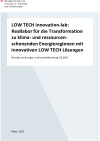
LOW TECH innovation-lab setzt sich den Aufbau eines Innovationslabors zum Ziel, in welchem auf Basis eines optimierten Ansatzes hinsichtlich Technikeinsatz einerseits und Potenzialen der Kreislaufwirtschaft, lokaler Umweltressourcen und sozialer Innovationen andererseits innovative Modellösungen entwickelt, erprobt und in Kooperation mit geeigneten Pilotregionen breit ausgerollt werden.
Schriftenreihe
76/2025
Edeltraud Haselsteiner, Sarah Teresa Fuchs, Thomas Zelger, David Sengl, Edit Paráda, Simon Schneider, Jasmin Helnwein, Natalie Taupe, Bernhard Lipp, Ute Muñoz-Czerny, Maria Wirth, Ines Kantauer, Harald Frey, Lisa Gallian, Martin Holper
Herausgeber: BMIMI
Deutsch, 95 Seiten
Downloads zur Publikation
Ökonomisch optimiertes Regelungs- und Betriebsverhalten komplexer Energieverbünde zukünftiger Stadtquartiere (ÖKO-OPT-QUART)
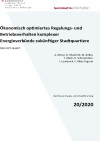
Im Projekt ÖKO-OPT-QUART wurden energietechnische, ökonomische und regelungstechnische Modelle zur Simulation der Betriebsführung komplexer, nachhaltiger Energieverbünde für Stadtquartiere entwickelt. Diese Modelle werden danach für eine Beispielkonfiguration zu einem umfassenden Gesamtmodell kombiniert und erlauben einen realistischen ökonomischen Vergleich verschiedener Regelungsstrategien. Das übergeordnete Ziel des Projekts ist die Entwicklung einer Methode zur systematischen Erstellung kostenoptimierender, vorausschauender Regelungsstrategien für komplexe Energieverbünde in Stadtquartieren.
Schriftenreihe
20/2020
A. Moser, D. Muschick, M. Gölles, T. Mach, H. Schranzhofer, I. Leusbrock, C. Ribas Tugores
Herausgeber: BMK
Deutsch, 67 Seiten
Downloads zur Publikation
TANZ – Sondierung Reallabor. Tourismus als Chance für die Energiewende im Pinzgau
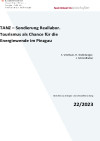
Sondierung für ein regionales Reallabor zur Beschleunigung der Klimaneutralität Österreichs 2040 in der Tourismusregion Pinzgau. Basierend auf zahlreichen Vorarbeiten wurden Realtests für die Innovationsfelder Sektorkopplung, Energiegemeinschaften und Nachhaltige Wärmelösungen konzipiert, die Organisationsstruktur des Reallabors erarbeitet und relevante Akteur:innen aktiv eingebunden.
Schriftenreihe
22/2023
S. Vitzthum, R. Stollnberger, J. Schmidhuber
Herausgeber: BMK
Deutsch, 59 Seiten
Downloads zur Publikation
REGOreal - 100% Renewable Energy Region: Local Energy Common Good Economy in real laboratories for networked energy and mobility cells
In REGOreal, the exploration for a 100% renewable energy region in the area of Retz-Horn-Krems-Tulln (Lower Austria) and Mallnitz (Ktn) is taking place. There are four focus topics: 100 Renewable Energy Communities (REC), 1.000 building renovations, 10.000 energy exporters (in the sense of employees who carry the approach into their private environment) and 100 Mio. km of sustainable mobility with extensive use of IT for the development of local integrated energy systems (IES) to integrate a colorful mix of different actors and objects.
Sondierung für ein Reallabor im zentralen Inntal für klimaneutrale semiurbane Gebiete (INNERGY)
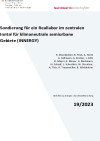
Die Potentiale von Bestandsquartieren und Industriebetrieben für eine nachhaltige Energieversorgung wurden in einem kleinstrukturierten Gebiet ganzheitlich und sektorenübergreifend erhoben und konkrete Umsetzungsprojekte für eine klimaneutrale Region ausgearbeitet.
Schriftenreihe
19/2023
R. Ebenbichler, B. Frick, A. Hertl, A. Hofmann, A. Kratzer, L. Köll, D. Meyer, K. Meyer, A. Riedmann, N. Schaaf, L. Schuchter, W. Streicher, A. Thür, R. Traunmüller, B. Winklehner
Herausgeber: BMK
Deutsch, 22 Seiten
Downloads zur Publikation
CITYGovernance: Übergeordnete klimaneutrale Governance für Städte
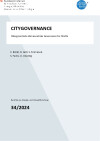
Ziel der F&E Dienstleistung war, Erkenntnisse über Hemmnisse und Hindernisse der übergeordneten Governance für die Zielerreichung “Klimaneutralität von österreichischen Städten” zu erlangen, zu strukturieren und in einer publizierbaren Studie aufzubereiten. Die Studie konzentriert sich dabei auf die Bereiche Energie, Gebäude und Mobilität und enthält Handlungsempfehlungen zu notwendigen Rahmenbedingungen und Änderungsbedarfen.
Schriftenreihe
34/2024
C. Böckl, H. Grill, S. Formanek, S. Fuchs, U. Unzeitig
Herausgeber: BMK
Deutsch, 140 Seiten
Downloads zur Publikation
DW² - Entwicklung einer thermisch verbesserten Schlitzwandkonstruktion
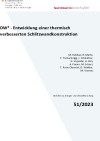
Die thermischen Eigenschaften von Schlitzwandkonstruktionen werden durch die Anwendung neuer Materialien und Herstellungsmethoden verbessert und durch Labor- und Feldversuche validiert sowie durch numerische und ökologische Betrachtungen ergänzt. Das Ergebnis kann bei der Errichtung von energetisch verbesserten unterirdischen Bauwerken wie beispielsweise Tiefgaragen oder zur Herstellung von Erdwärmespeichern verwendet werden.
Schriftenreihe
51/2023
M. Rebhan, R. Marte, F. Tschuchnigg, J. Schleicher, G. Vojvodic, H. Kim, A. Passer, M. Scherz, T. Potrc Obrecht, G. Winkler, M. Vremec
Herausgeber: BMK
Deutsch, 55 Seiten
Downloads zur Publikation
KLIMUR – Klimaresilientes urbanes Ressourcenmanagement am Fallbeispiel Zukunftshof und Rothneusiedl
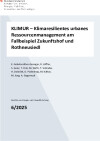
Für das Konzept des Zukunftshofs, einer innovativen urbanen Landwirtschaft, sollen durch Optimierungstools und parametrischem Design Entwicklungsszenarien für ein integriertes Energie- und Ressourcenkreislaufsystem entwickelt werden. Eine Roadmap, bestehend aus technischen Konzepten und einer abgestimmten Finanzierungsstrategie, soll die Grundlagen für ein Demoprojekt liefern, das in der Praxis zeigt, wie der Zukunftshof Ausgangspunkt und Basis für eine ressourceneffiziente und klimaresiliente Stadtentwicklung sein kann.
Schriftenreihe
6/2025
E. Gebetsroither-Geringer, R. Löffler, S. Geier, T. Fink, M. Wirth, T. Vobruba, H. Dolinšek, D. Podmirseg, M. Kaftan, M. Jung, A. Gugumuck
Herausgeber: BMK
Deutsch, 46 Seiten
Downloads zur Publikation
Sondierung des wesentlichen F&E-Bedarfs zur Optimierung von städtischen Energiespeichern in integrierten Energiesystemen (CityStore)
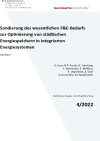
In CityStore wird erstmals ein innovativer Ansatz zur räumlichen Verortung von Speicherbedarf und -potentialen verfolgt. Dies inkludiert die Evaluierung der konkreten Herausforderungen und Voraussetzungen sowie die Identifikation von sinnvollen Speichertechnologien und -kapazitäten. Dazu werden Modellrechnungen für die Vorzeigestädte Graz und Weiz durchgeführt und die Verallgemeinerungsfähigkeit der Ergebnisse anhand der Follower-Region Südburgenland untersucht. Die Resultate sollen optimierte Planung und Realisierung von städtischen Energiespeichern ermöglichen – wodurch zielgerichtet in Energieinfrastruktur zur Umsetzung von (lokalen) Klima- und Energiezielen investiert werden kann.
Schriftenreihe
4/2022
D. Suna, N.P. García, G. Totschnig, S. Wimmeder, E. Meißner, R. Ungerböck, A. Graf, A. Dornhofer, M. Niederkofler
Herausgeber: BMK
Deutsch, 153 Seiten
Downloads zur Publikation
SeasonalGridStorage - Innovative saisonale Wärmespeicher für urbane Wärmenetze

In diesem Projekt wurden Konzepte zur Nutzung innovativer Speichertechnologien, wie thermochemische Speicher (TCS) mit hohen Energiedichten und der Möglichkeit der druck- und verlustlosen Speicherung entwickelt und mit Hilfe von Simulationsrechnungen in technischer, ökologischer und wirtschaftlicher Hinsicht untersucht sowie rechtliche Randbedingungen bewertet.
Schriftenreihe
21/2018
M. Köfinger, D. Basciotti, D. Lager, O. Terreros, C. Zauner, H. Böhm, J. Lindorfer, R. Tichler, A. Zauner
Herausgeber: BMIT
Deutsch, 151 Seiten
Downloads zur Publikation
Umsetzung regionaler Elektromobilitätsversorgung durch hybride Kopplung (Move2Grid)
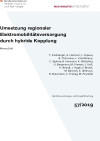
Aufbauend auf den Ergebnissen der „Stadt der Zukunft“ Sondierungsprojekte „Smart Exergy Leoben“, und „Energieschwamm Bruck“ soll im gegenständlichen,umsetzungsorientierten Forschungsvorhaben anhand des Beispiels Leoben untersucht werden, wie mit regionalen, erneuerbaren Ressourcen regionale Elektromobilität langfristig versorgt, optimal ins kommunale Verteilernetzsystem integriert und ökonomisch nachhaltig implementiert werden kann.
Schriftenreihe
57/2019
T. Kienberger, A. Hammer, J. Vopava, B. Thormann, L. Kriechbaum, C. Sejkora, R. Hermann, K. Watschka, U. Bergmann, M. Frewein, J. Koß, H. Brandl, J. Vogel, S. Moser, M. Baresch, K. de Bruyn, R. Braunstein, C. Freitag, M. Peyreder
Herausgeber: BMVIT
Deutsch, 172 Seiten
Downloads zur Publikation
Erforschung des ersten österreichischen Erneuerbare-Energiegemeinschaften Gewerbe- und Industrieparks (REC-Businesspark)
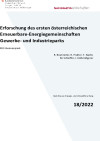
Im Zuge des Projekts erfolgte die Konzeptionierung eines Zero-Emission- bzw. Plus-Energie-Gewerbeparks in Weiz mit Fokus auf Photovoltaik und Brennstoffzelle in Kombination mit einer Erneuerbaren Energiegemeinschaft (E-EGe). Durch die Gründung auf der "grünen Wiese" können sämtliche Strukturen entsprechend den Anforderungen der E-EGe geschaffen werden.
Schriftenreihe
18/2022
R. Bramreiter, R. Pratter, T. Nacht, M. Schloffer, I. Kolb-Stögerer
Herausgeber: BMK
Deutsch, 48 Seiten
Downloads zur Publikation
DW² - Entwicklung einer thermisch verbesserten Schlitzwandkonstruktion
Die thermischen Eigenschaften von Schlitzwandkonstruktionen werden durch die Anwendung neuer Materialien und Herstellungsmethoden verbessert und durch Labor- und Feldversuche validiert sowie durch numerische und ökologische Betrachtungen ergänzt. Das Ergebnis kann bei der Errichtung von energetisch verbesserten unterirdischen Bauwerken wie beispielsweise Tiefgaragen oder zur Herstellung von Erdwärmespeichern verwendet werden.
